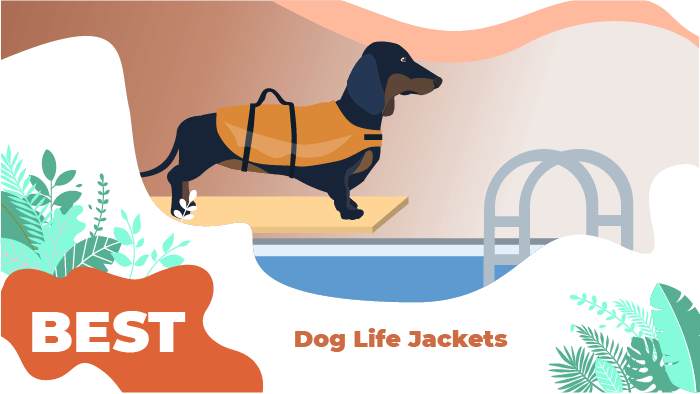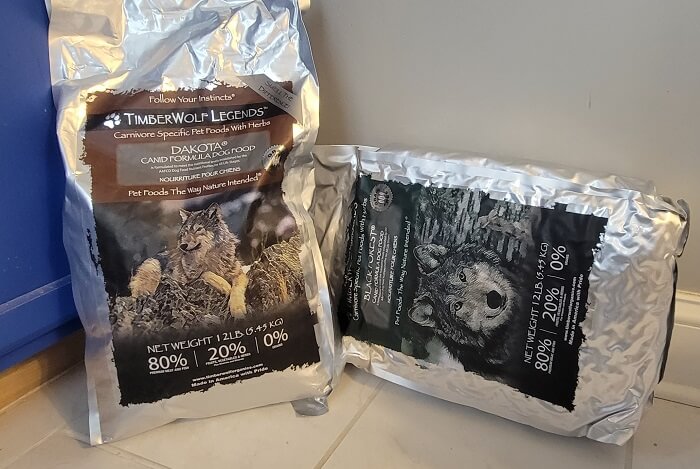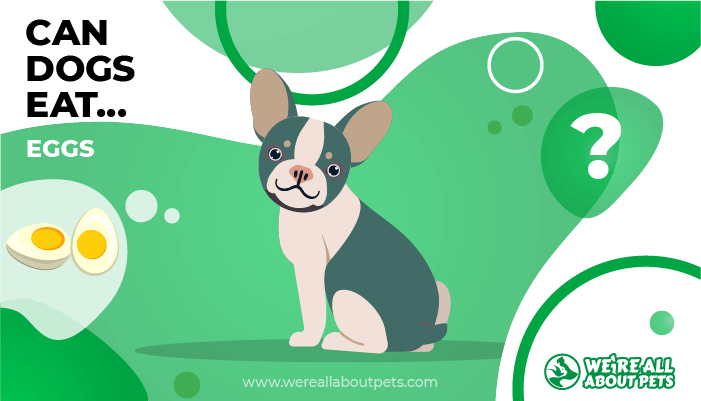Can Dogs Eat Watermelon?
This page contains affiliate links. We may earn money or products from the companies mentioned in this post through our independently chosen links, which earn us a commission. Learn More
Have you ever been eating a sweet, juicy piece of watermelon, only to have your dog sit staring at you with pleading eyes, begging for a bite?
That’s happened to most of us. What should you do? Is it okay to give your dog some watermelon? Can dogs eat watermelon?
The answer is yes – and no. Some parts of the watermelon are okay to share with your dog, if you take precautions. But other parts are not a good idea to give your dog.
Read our guide about dogs and watermelons to see what’s safe to give your dog.
Watermelon Nutrition Stats
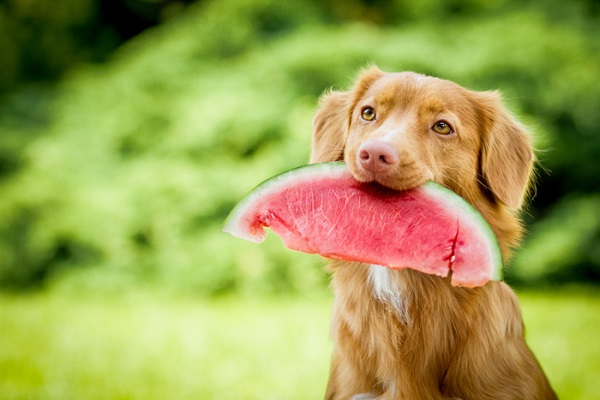
Watermelon is mostly (92 percent) water which makes it very refreshing. One cup (154 grams) is considered to be a serving size for a human.
It contains the following:
- 46.2 calories
- 0.9 grams protein
- 0.2 grams fat
- 11.6 grams carbohydrates
- 0.6 grams dietary fiber
- Vitamin A 876 IU
- Vitamin B6 0.1 mg
- Vitamin C 12.5 mg
The watermelon is related to cucumbers, pumpkins, and squash.
Watermelon Nutritional Facts At A Glance
Each juicy bite of watermelon has significant amounts of vitamins A and C, along with lots of lycopene. It’s also virtually fat-free and has only 46 calories per cup.
As with other fruits, watermelon is very low in saturated fat, cholesterol and sodium. It is also a good source of potassium, and a very good source of vitamin A and vitamin C.
However, a significant portion of the calories in watermelon come from sugars.
These are mostly simple sugars such as glucose, fructose, and sucrose. It also contains a small amount of fiber. It is not considered to be a good source of fiber compared to other fruits.
In terms of the glycemic index, which measures how quickly foods raise blood sugar levels after meals, watermelon is between 72 and 80 which is high.
Compared to many other fruits, watermelon is not a good source of antioxidants. However, it is rich in two important compounds: the amino acid citrulline and the antioxidant lycopene.
Watermelon is the richest dietary source of citrulline. The white part of the rind is especially rich in this substance. In the human body, citrulline is transformed into the essential amino acid arginine. Many organs require arginine to function.
Watermelon is also the best-known fresh source of lycopene. This is the antioxidant that gives watermelon its red color. Watermelon contains more lycopene than tomatoes. The body uses lycopene to form beta carotene which is then converted to vitamin A.
Can Dogs Eat Watermelon?
Yes, dogs can eat the fleshy pink part of the watermelon, in moderation. It’s recommended that they do not eat the seeds of the watermelon because of the remote possibility they could be a choking hazard in some dogs. You can remove the seeds from the pieces you give your dog or buy seedless watermelon.
It’s also recommended that you do not allow dogs to eat the rind of the watermelon because it is difficult to digest.
Allergies to watermelon are very rare in humans but they do occasionally occur. It is possible that a dog might have an allergic reaction to watermelon, though it is very unlikely.
Watermelon is high in FODMAPs (fermentable oligo-, di-, mono-saccharides and polyols) which are fermentable short-chain carbs that bacteria in the gut uses for fuel. Some people and dogs can be sensitive to FODMAPs.
For dogs with irritable bowel problems, it’s probably best to avoid watermelon. This sensitivity can lead to unpleasant digestive symptoms such as bloating, gas, stomach cramps, diarrhea, and constipation.
Is Watermelon Good for Dogs?
Most dogs should be able to eat watermelon, in moderation, without any problem. This is a sweet, juicy treat that dogs enjoy and it’s good for them. It’s low in calories with lots of vitamin A and C. Plus it has the very beneficial citrulline and lycopene compounds.
Because of the high sugar content in watermelons, talk to your veterinarian before giving any to your dog if he is diabetic or has any other chronic health issues. You should also avoid giving watermelon to your dog if he has a sensitive stomach because of the FODMAPs/carbs.
How Much Watermelon Can (Should) Dogs Eat?
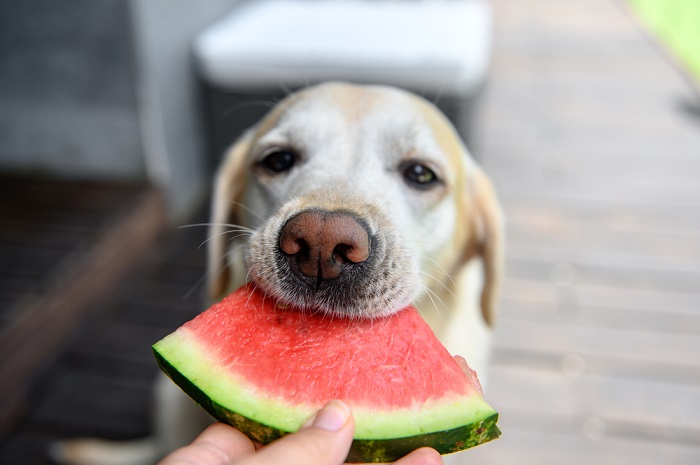
If your dog is able to eat watermelon, you should be able to give your dog watermelon occasionally without any problem. Giving your dog too much watermelon or too often, however, could lead to digestive upset.
In general, treats (even healthy treats) shouldn’t make up more than 10 percent of your dog’s daily calories. So, if your dog weighs 30 pounds and he gets about 800 calories per day, he shouldn’t have more than 80 calories in treats.
A cup of watermelon pieces has about 46 calories. That would be more than enough watermelon for a 30-lb dog. In fact, if your dog is not used to eating watermelon, you would probably want to start with just a couple of small pieces to let him get used to the fruit. That way he would probably be less likely to have an upset stomach.
How Often Can Dogs Eat Watermelon?
If your dog loves watermelon, try giving him some 2-3 times per week. You can rotate with some other fruits, berries, and vegetables so your dog has a variety of flavors and textures in his diet.
The Correct Diet Is Important
Dogs need to eat the correct diet for good health. This means that they require good quality protein and fat. Foods like watermelon should only be given as an occasional treat.
While there are many different ideas about good dog foods and different ways to feed dogs, your dog needs the following in his diet:
- Good Sources of Protein- All dogs need good sources of protein in their diet. Meat, fish, poultry, and eggs are all good sources of animal protein.
- Good Sources of Fat- Fat provides essential fatty acids (EFA) and helps distribute the fat soluble vitamins A, D, E, and K so your dog’s body can absorb them.
- Named Ingredients- Look for named ingredients in your dog’s food and avoid generic ingredients. The more specific the ingredient is, the better. Otherwise, you can’t be sure what you are feeding your dog.
- Low to Moderate Carbohydrates- Many dog foods are loaded with carbohydrates. This is true even with some good quality dog foods. Carbohydrates are not “bad” and they can be beneficial (dietary fiber can come from carbs, for example). But carbs should not be a substitute for protein.
- Avoid Artificial Colors, Preservatives, and Sweeteners- Artificial preservatives and colors/dyes have been linked to some health problems in humans and animals. You should try to avoid these ingredients in dog foods.
- AAFCO- AAFCO is the Association of American Feed Control Officials. AAFCO sets voluntary standards for pet food labeling. Look for foods that follow these minimum standards.
- Fresh Water- All dogs need easy access to fresh water unless they are ill or have some other reason to be temporarily kept away from water. For example, you might keep water from a puppy overnight while you are house training him.
What Are Other Healthy Alternatives to Watermelon In A Dog’s Diet?
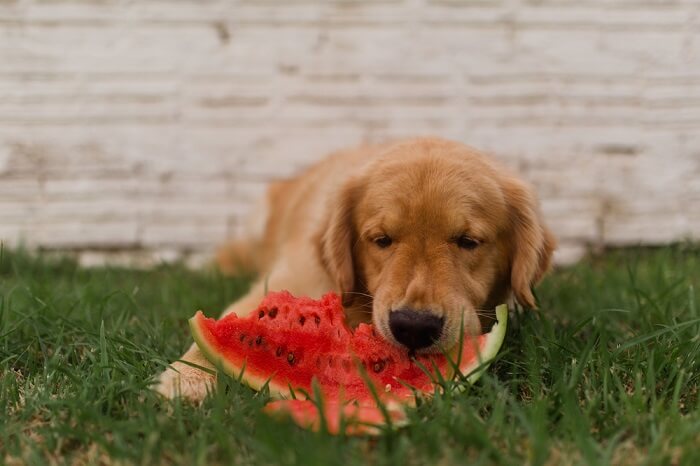
Watermelon are a healthy treat but there are many other fruits and vegetables that can provide some of the same benefits. You should consider these foods as treats. Give them to your dog occasionally and in moderation.
Check with your veterinarian if your dog has any health issues and you are concerned about giving any of these foods.
- Apples
- Asparagus
- Bananas
- Bell pepper
- Blueberries
- Broccoli
- Brussels sprouts
- Carrots
- Cauliflower
- Cranberries
- Cucumber
- Green beans
- Mangos
- Oranges
- Parsnip
- Pears
- Pineapple
- Pumpkin
- Strawberries
- Summer squash
- Sweet potato
- Tomatoes
- Zucchini
How Do You Give Your Dog Watermelon?
The easiest way to give your dog watermelon is to slice some of the pink flesh from the watermelon. Remember to remove the seeds (or buy seedless watermelon). We suggest that you do not give your dog the rind because it’s so difficult to digest.
Some people like to use a melon baller to scoop out small bites for their dog to eat. Whatever you use, make sure that the pieces are a good size for your dog to eat. It’s unlikely that a dog would choke on a piece of watermelon but it’s always possible.
You should not give your dog any artificially-flavored watermelon products. These items usually contain added sugar and possibly preservatives that are bad for your dog.
Conclusion
Wondering if dogs can eat watermelon? Yes, with a few precautions. Most dogs can eat watermelon. If your dog has digestive problems, diabetes, or any chronic illnesses, talk to your veterinarian. You may want to avoid giving your dog watermelon.

